Tools for Success
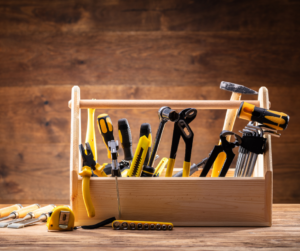
Tools for Success
Managing my symptoms of Functional Neurological Disorder is easier on some days than others. When life is going smoothly, I can even get a bit lazy about my self care without any noticeable effects.
Can anyone say life is going smoothly for them these days? Not me! Who would have imagined 6 months ago that we would be in the middle of a pandemic now? I never envisioned that there would be a time when we would have to hunker down and isolate from other people for months in order to protect ourselves from a potentially deadly virus.
We sold our house April 1 and had planned to travel in our RV while we waited for our new home to be built. A week before our closing we realized we needed to find somewhere to live that would provide more stability. Thankfully we found a cute cabin to rent in the mountains that feels like we’re on vacation instead of lockdown.
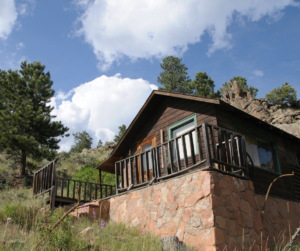
Even though I prefer silence and love my alone time, it’s a bit much to go to this extreme. I’ve lost some of the things that help me feel stable and supported. I haven’t seen friends in person for months. For awhile, we isolated from our daughter and her family who live near us. It was breaking my heart and my 2 year old granddaughter missed her Grammy and Papa, so we decided to cautiously interact. Since both of our families are staying at home as much as possible, we thought there was probably minimal risk of spreading illness. Even though we’ve only gotten together a few times, it’s helped my mental health immensely.
Nevertheless, my “window of tolerance” has been closing rapidly. The fear of infection striking the households of my family or friends, the uncertainty about the future, the rapid change in how we go about our daily lives, political and social unrest… our current world is challenging for the most stable of nervous systems. What about those of us who live with more fragile ones?
Some people talk about “toolkits” to describe the things they use to stabilize themselves when life gets tough. As someone who has been a part of the world of medicine, I usually think of my list of resources as my “first aid kit”.
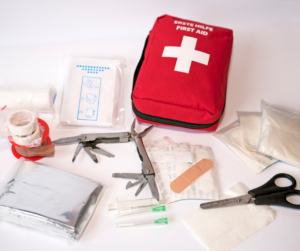
Last week I had an incident as bad as I’ve experienced in the past few years. My FND was threatening me full force. An emotionally upsetting event pushed me over the edge. I was hanging on by a thread and had to pull out every tool I could think of. Forget the euphemisms of “toolkit” and “first aid kit”. I was coding, had to pull out the crash cart, and the resuscitation lasted for hours.
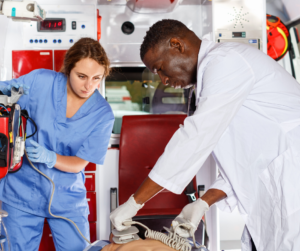
My speech was shot, my legs were weak and uncoordinated, and my mind was sludge. I felt overwhelmed and out of control. My personal best tool is my mirror, so that’s where I headed. Sitting in front of my full length mirror, I reminded myself that I would be okay. Remember that your brain tends to believe you- anticipating a relapse may just trigger one. I tried to reassure my brain that it will soon return to normal because I now know how to restore my function. It’s easy to become frightened or frustrated by symptoms, but learning to accept them without judgment makes it easier to bring them under control. Fear and anger increase the activation in our nervous systems. When symptoms are flaring, our goal is to lessen our feelings of overwhelm and return to a more settled, in-balance state.

I struggle with dissociation when I’m upset, something I learned during my difficult childhood in order to survive. It was the way my mind protected me back them from things that were too hard to comprehend and live through. When I am overwhelmed emotionally, my mind wants to escape from the pain and confusion. The escape is alluring in a lot of ways, but I remind myself that it comes at a high cost. When I let myself dissociate, I’m weakening my link with reality and good health. Observing myself in the mirror helps me hold on to the reality of my existence and the physical presence of my body. Presence is the opposite of dissociation. I like to stretch and move my muscles while I’m watching in the mirror, feeling the movement and thinking about the physical sensations I’m noticing. Movement seems to help my brain recognize that those are my muscles responding to its direction. It helps me to feel more whole and connected.

It took awhile to feel more present in my body, then I moved on to some grounding meditations. “Grounding” is such a powerful tool for me. Whatever keeps you feeling connection to the world around you is grounding. When I’m grounded, even gravity feels stronger. “Earthing” is a practice where you use your bare feet to literally connect with the earth. Think about what you are feeling on the bottom of your feet- the cool grass, warm sand, coarse gravel… different textures increase the sensation felt in your body.
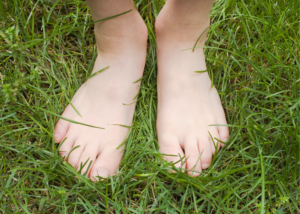
I like to use guided meditations when I meditate. It helps me to feel more connected to my body and the world. Some people meditate focusing on the breath, or try to empty their minds of thought, but for me, those practices lead me to feel more dissociated. The great thing about meditation practices available now is there are so many options. Lately I’ve been hearing more about “trauma-informed” practices for people like me who struggle with the lingering effects of trauma. If one type of meditation doesn’t help you feel calmer and more in control, try something different. Our individual needs and preferences are unique.
There are a number of guided meditations available, many for free. If you search for “grounding meditations”, you will find plenty to choose from. Listen to the ones that look interesting, then save the ones that are a good fit for you. I’m a little picky about the voices that I like, which led me to give up an app I had used for a long time because I found the primary speaker’s voice irritating. There are so many options and apps that are forever changing that I hesitate to recommend any particular one. Most come with a free trial. Try one for a few days to see how you respond to it. I’ve been experimenting with writing my own meditations and recording them. It’s been fun to creatively play with that because then I can say the things that I know I need to hear, messages important for my mental health but missing from my early brain programming.
When I finally felt more settled and grounded last week, I just rested. I pulled out my weighted blanket, which added to my feeling of being present. Often I’ll rest on the couch and my 2 small dogs happily lay on top of me in lieu of a weighted blanket. I applied some lavender essential oil to my pillow and my wrists, just to add another sensation to hold on to. Bringing as many senses as possible into your awareness is a great way to feel more in control.

Good news! I survived! Now I’m back to actively practicing the activities that keep me in a healthier state. My window of tolerance was only wide enough to let oxygen pass through last week, but I’m breathing nice big gulps of fresh air now.
What things are most comforting to you? You might want to make a list to have handy the next time you are struggling to manage your symptoms. I’ve included a list of my favorites that you are welcome to print out, but feel free to adapt the list for the things that are most helpful to you.
Wishing you the best in these difficult times, with hopes of healing for our sick and hurting world,

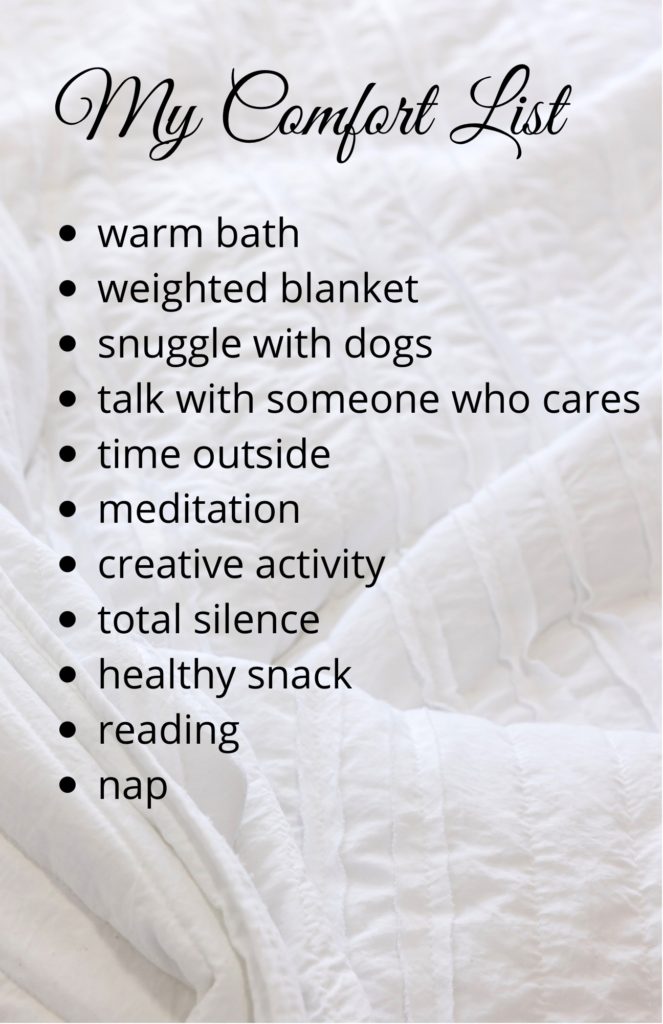

Thank you Max..I wish I knew of you when I was first diagnosed! I have been talking with my husband about doing some help videos for people. I agree with you that focusing on our symptoms seems to worsen them. Xoxo Linda
Thanks for your comment, Linda. I would love to see your videos! There are so few resources for those of us with FND. You can always email me at max@fndrecovery.com
Wishing you the best,
Max
Thank you for the comfort list. I have FND too and it’s sometimes hard to really relax.
I was looking for someone who has FND who recommended a weighted blanket. Thank you for sharing. I appreciate it.
Hi Max,
I’m currently going through the process of diagnosis and I’m keen to focus on my recovery and not symptoms. Your site has been such a source of encouragement and hope. I notice on this article you mentioned you had a list of things you found comforting to help manage symptoms. I couldn’t see this (I may have missed it) could you point me in the right direction as I think it could be helpful in my thinking of my own supportive things. Thank you, Charlotte
Hi Charlotte,
Thanks for catching that! I’ve now added the photo with my list of comfort measures. What’s on your list?
All the best,
Max